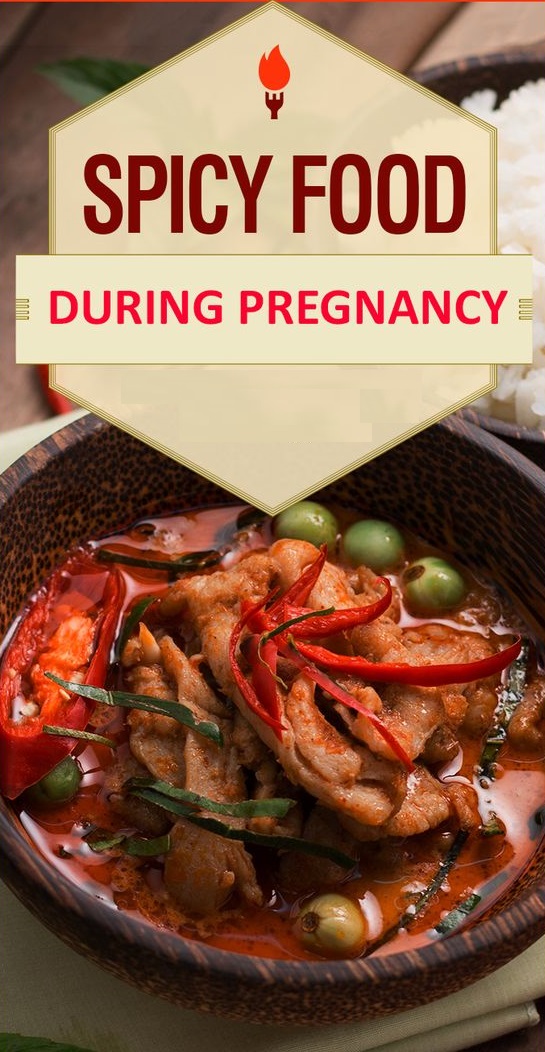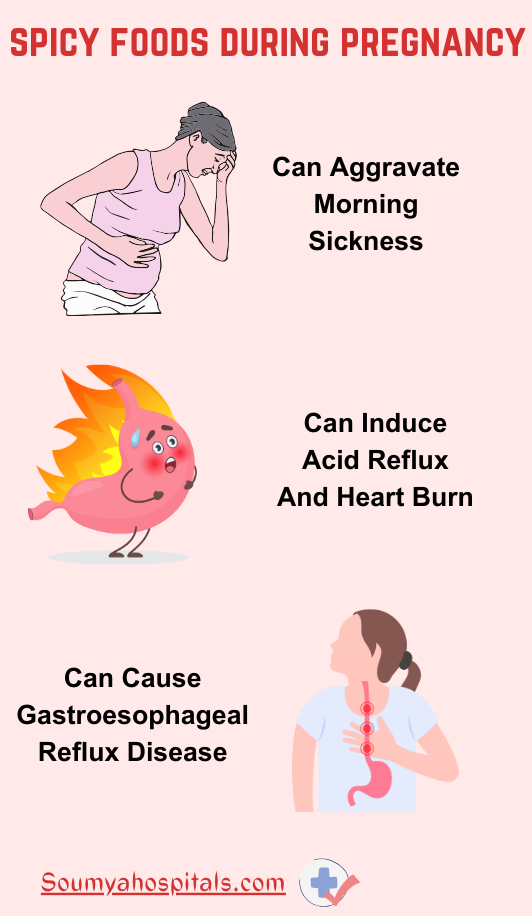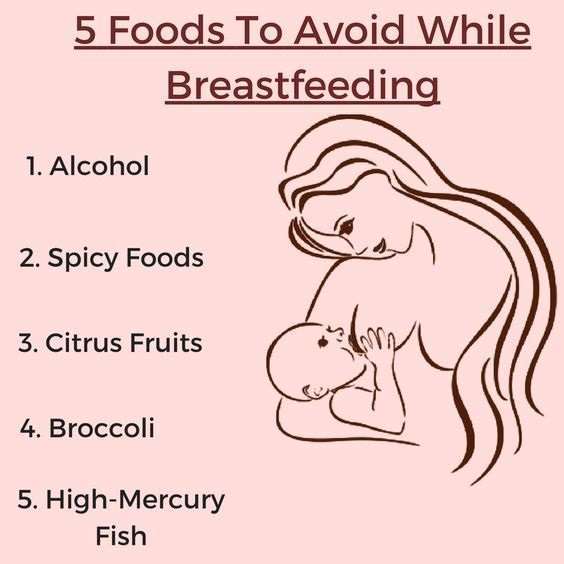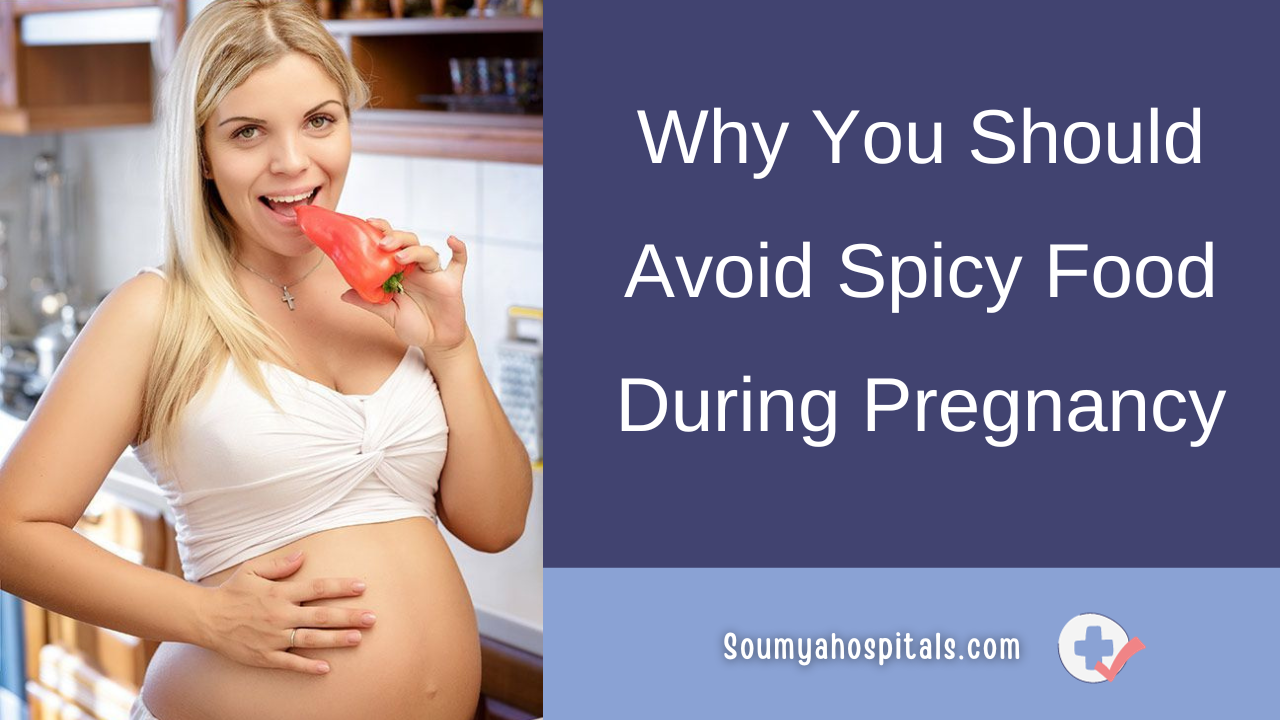Any spicy foods you eat do not harm your baby when you’re pregnant or while breastfeeding. During pregnancy, only a minor fraction of what you eat goes into the amniotic fluid. And while breastfeeding, what you eat has only a slight effect on the taste of the breast milk. Spicy foods cause no other changes for the baby. But you are a different matter altogether!
Are spicy foods bad during pregnancy?

Almost every culture in every country has its own belief about pregnancy diets. From spicy foods increasing body heat to inducing early labor, the myths are many. But it’s good to know your facts before completely eliminating peppery hot foods from your diet.
Are you a healthy pregnant woman without any kind of gastrointestinal (GI) or gastroesophageal issues? Go ahead and eat what you like, provided you don’t overeat. Were you naturally prone to GI issues even before pregnancy and are now facing pregnancy side effects such as acid reflux and morning sickness? Then, you need to be a little more cautious.
Let’s take a closer look at the negative symptoms of pregnancy and how spicy foods affect them:
1. Can Aggravate Morning Sickness
Although it’s commonly referred to as morning sickness, it can strike any time during the day. Although the frequency differs for each woman, on an average, it usually starts by around 5 weeks after you stop menstruating and reaches the peak between the 8th and 12th weeks. This nausea and vomiting during pregnancy mostly protect the mother and the embryo from any ill effects of certain foods, such as the spicy ones. And here’s how they might increase your side effects:
- Sensitive smell: Smelling spicy foods might trigger a gag reflex in you. It would be good to avoid even bringing spices into the house in such cases.
- Delicate stomach: Pregnancy results in a delicate and sensitive GI tract, which can be easily affected by spicy foods. They can induce frequent vomiting and diarrhea.
So, if you’re craving for spicy food but it has an adverse effect on your health, avoid the foods. If you’re craving for spicy foods and it has no effect on your health, go ahead and eat what you like in limited quantities. If you’ve always loved spicy food but it now triggers your morning sickness, avoid it completely.
2. Can Induce Acid Reflux And Heart Burn
During pregnancy, your digestive system slows down and there’s less space in the stomach, which causes the stomach acids to run up the esophagus and cause acid reflux. Acid reflux results in heartburn, burping/regurgitating, and nausea. A heartburn is a burning sensation in the chest, just behind your breastbone. Although the burn might not seem as troublesome as nausea and won’t affect your baby in any way, it’ll definitely bother you to no end.
Although the causes of these can be multiple foods, many women have stated that spicy foods aggravate these conditions. The best way to deal with spicy-food-related heartburn is to completely avoid them during pregnancy, even if you love them! Reintroduce them into your diet post-pregnancy, when your digestion is stronger.

3. Can Cause Gastroesophageal Reflux Disease (GERD)
If the heartburn wakes you up constantly in the night, vanishes only as long as the antacid works, and causes other issues like coughing, weight loss, difficulty in breathing, or black stools, it might indicate GERD. This needs to be treated immediately to avoid any damage to the esophagus.
While there’s not enough evidence to prove that spicy foods can actually be the root cause of GERD in all women, it can affect if you’re sensitive to it. If your body is too delicate and can’t handle the spice, regulate your diet to avoid worsening the condition. Also, when the esophagus is already weakened by GERD, spicy foods can easily irritate the lower esophageal mucosa and cause severe heartburn.
If you were prone to GERD even before pregnancy, you know which foods to avoid. If not, the only way to figure out the foods to avoid is to see if the GERD symptoms occur or worsen after eating specific foods.
Are Spicy Foods Bad While Breastfeeding?

After restraining yourself from spicy foods during pregnancy, you might be craving for some post-pregnancy tangy dishes. If you are holding back thinking that it might affect the baby, put your worries behind right now.
As mentioned earlier, a change in diet induces a slight change in the breastmilk taste. In many countries with a spicy local cuisine, women do not alter their diet during pregnancy, and this has no effect on the newborn. In fact, it helps because babies form their taste preferences when in the womb. So eating regular food during pregnancy can make the baby get used to the staple foods, even if it includes spicy stuff.
Many people and cultures assume or believe that such foods might trigger gastritis issues in the baby. This is a myth with no supporting scientific evidence. If your baby doesn’t like the change in flavor of the breastmilk, the baby will be irritated and might refuse to feed as much as usual. So avoid spicy foods only if you feel a discomfort of any kind and if your baby refuses to drink the milk.
How Much Of Spicy Is Good?
The pregnancy diet is crucial as you’re eating for two. Your baby’s nutrition and healthy development depend completely on your lifestyle and the foods you eat. While it is important to load up on vitamins, minerals, calcium, proteins, and what not, it is also important to have a variety of foods and know what’s good for you.
There’s no one list of bad spicy foods that might affect pregnant women as each of you are different; each of you is allergic and sensitive to different foods. So, in summary, try different hot and peppery foods and observe your and your baby’s reactions. Introduce your baby early on, when in the womb, to different cuisines. In the end, make sure both of you do not face any kind of discomfort and stay healthy.
Read More Posts:
